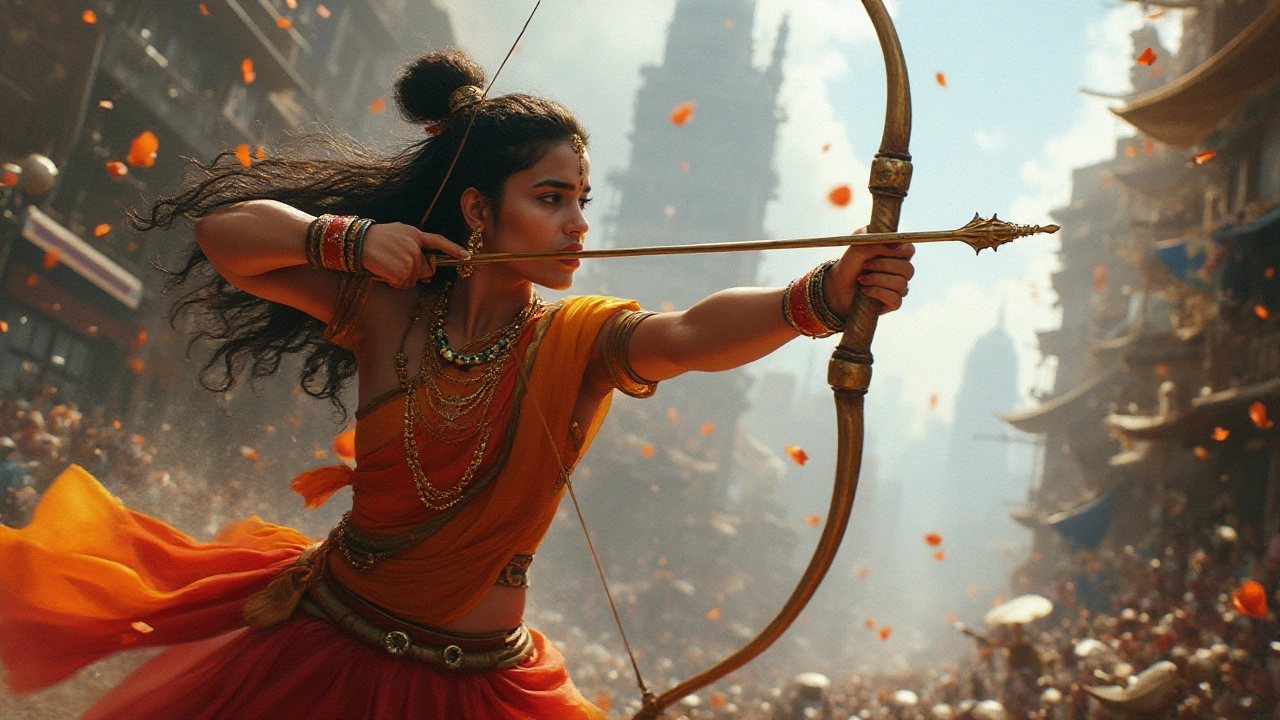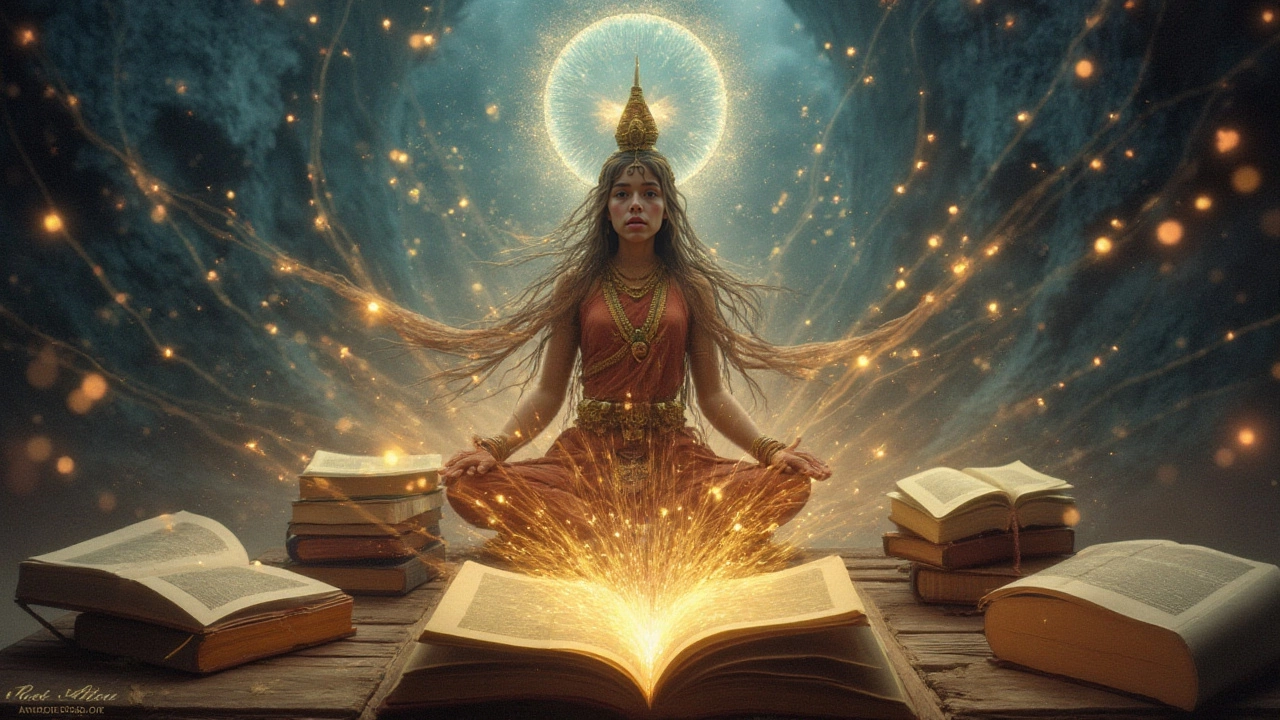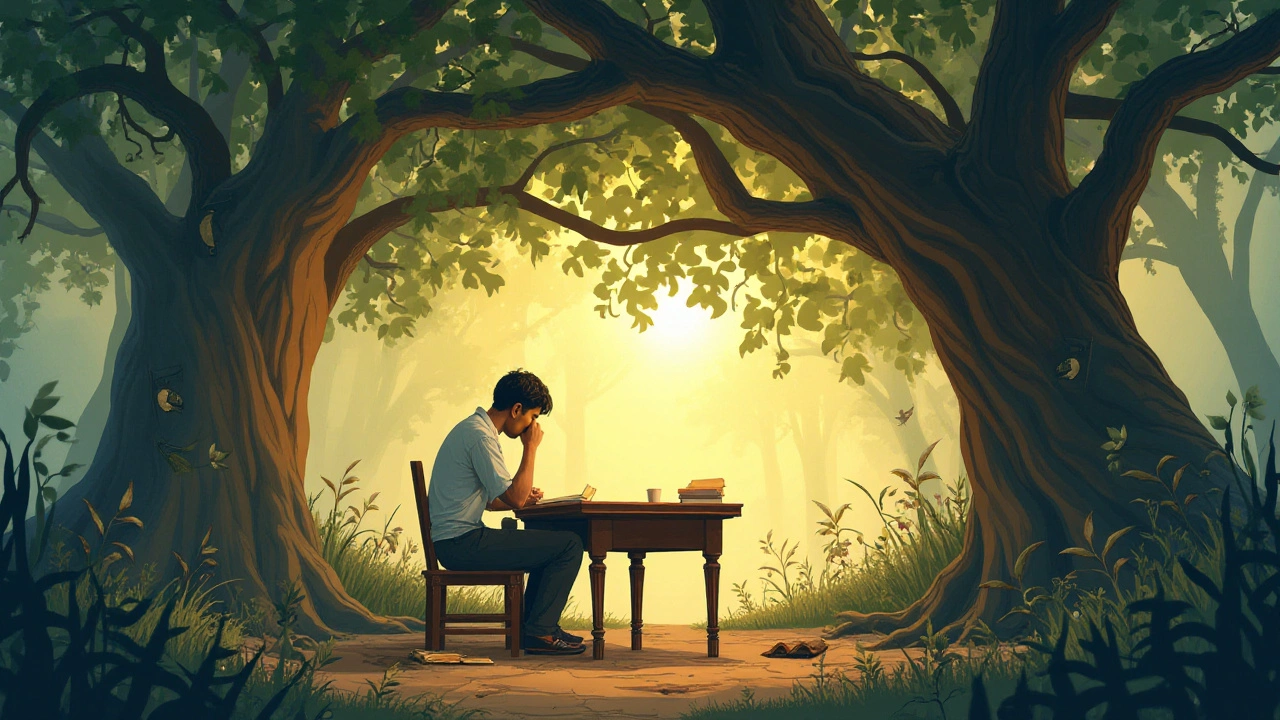Exploring the Wonders of Mythological Fiction: A Journey into Myth and Imagination
 Jan, 21 2025
Jan, 21 2025
Mythological fiction is where storytelling meets the mythical world, a genre that sweeps readers off their feet and transports them into realms filled with gods, heroes, and fantastical creatures. This blend of the old and the new brings familiar tales of mythology into fresh narratives, captivating a modern audience keen for both ancient wisdom and thrilling plots.
In this genre, one finds a symphony of imagination and tradition. Writers harness the timeless lure of myths, weaving them into stories that are both enchanting and resonant with contemporary themes. It’s a world where imagination knows no bounds, and where the fantastical becomes anything but distant.
This exploration will unravel the nuances of mythological fiction, highlighting its origins and distinctive traits that appeal to the imagination. Whether you're an avid reader or an aspiring writer, delving into the magic of myth fiction offers a dive into storytelling's profound ability to shock, surprise, and illuminate the human experience.
- Understanding Myth Fiction
- The Roots of Mythological Storytelling
- Characteristics of Mythological Fiction
- The Appeal of Myth and Magic
- Tips for Writing Myth Fiction
Understanding Myth Fiction
When we talk about myth fiction, we're diving into a genre that connects the deep wells of ancient mythology with the crafted narratives of modern fiction. This genre finds its roots in stories told long before books were bound, using them as scaffolds to build new worlds filled with wonder. Mythological fiction is not merely a retelling of myths; it's a reinvention, breathing fresh life into age-old tales while embedding them with contemporary relevance. Through this blend, writers create an experience that speaks both to the past and the present, capturing the essence of human stories that are both deeply personal and universally shared.
In myth fiction, you'll find iconic characters like Zeus, Odin, or Anansi not frozen in time, but rather influencing new settings brimming with modern dilemmas. This genre allows writers to explore complex themes such as heroism, morality, and the eternal struggle between chaos and order, while interweaving these elements into plotlines that captivate readers. As the famed mythologist Joseph Campbell once noted,
'Myths are public dreams, dreams are private myths.'These potent narratives resonate because they echo the hidden myths within us, allowing readers to experience a sense of discovery and familiarity simultaneously. This is where the real magic happens – myth fiction isn't restricted by the rigid boundaries of reality, but is instead leaped forward by the imaginations of both the storyteller and the audience.
While reading mythological fiction, one might notice the seamless weaving of allegory and actuality. This harmony instills life and depth into characters and narratives. Authors often extract elements from diverse mythologies – whether it's the Norse sagas, the rich tapestry of Hindu epics, or the threadbare legends of the Celts – to create stories that not only honor the original essence but introduce unexpected twists. Reading these tales becomes an enlightening journey, akin to savoring a rich tapestry that unfolds with each turn of the page, compelling readers to dream beyond the confines of their known worlds. The embrace of fantasy and myth in fiction is not just about escapism but understanding, about finding different shades of truth within imagined realms. According to a survey done in 2021, 65% of fantasy readers appreciate mythological fiction for its distinctive narrative styles and the profound truths it reveals about humanity across cultures. Such engagement highlights the growing intrigue and its rightful place in modern literary pursuits.
The Roots of Mythological Storytelling
Mythological storytelling is as ancient as humanity itself, a tapestry woven through the annals of time, telling tales that define cultures, beliefs, and the human condition. Going back to ancient civilizations, these narratives have served a purpose far beyond mere entertainment. They were vessels of knowledge, encapsulating the morals, values, and existential views of societies. From the intricate cosmogonies of Greece, filled with gods battling for supremacy, to the epic tales of the Ramayana in India, mythological fiction serves as both mirror and shaper of cultural identity. These stories were not just told for the sake of telling, but to answer significant questions about human existence, morality, and the universe.
One could argue that mythological stories were the first form of philosophy, seeking to provide explanation and meaning in an unpredictable world. For instance, ancient Egyptians crafted myths surrounding life after death, a complex array of beliefs that shaped their spiritual practices and societal norms. These stories carried great weight, offering not just explanations but reassurances in times of uncertainty. In many cases, these tales have their roots in oral traditions, passed down from one generation to the next, thereby evolving and adapting to the needs of each era and culture.
"Myth is much more important and true than history. History is just journalism and you know how reliable that is." - Joseph Campbell
Moreover, mythological fiction has often been closely tied to religious beliefs, shaping the understanding of the divine and its interaction with the mortal realm. In the Norse sagas, gods walked amongst mortals, teaching us about vengeance, fate, and heroism, resonating with audiences who valued bravery and honor. These narratives, over time, influenced many modern literary works, echoing through genres such as fantasy and adventure, demonstrating their timeless appeal and adaptability. Indeed, they offer a rich resource for writers, who draw upon these ancient wellsprings to infuse their stories with themes of power, transformation, and destiny.
Across continents, these stories grew and diverged, reflecting the landscapes they inhabited and the peoples they belonged to. Whether through pantheon-based tales of Greek mythology or the animistic creation stories of Indigenous cultures, they not only depicted deities and heroes but also imbued rivers, forests, and plains with mythical significance. The commonalities and variations in these stories are a reflection of human unity and diversity, showing the universal quest for understanding and meaning. In Greek mythology, for example, the gods embodied human-like flaws and virtues, teaching through their narratives about hubris and humility, as seen in the tragic tale of Icarus's overconfidence.
For those who delve into myth, it becomes apparent how much we owe to these ancient stories. They are the seeds from which countless branches of storytelling have grown, offering not only fodder for the imagination but a deep well of wisdom and connection to our shared human ancestry. Thus, the enduring power of mythological fiction lies in its roots, an unyielding influence in literature, art, and culture, inspiring countless generations to explore questions of identity, purpose, and the sacred dance between the known and the mysterious.

Characteristics of Mythological Fiction
In the richly woven tapestry of mythological fiction, certain characteristics consistently emerge, giving the genre its unique and compelling identity. At its heart, myth fiction draws from ancient myth and folklore, marrying these age-old tales with the limitless possibilities of fiction. A defining feature of this genre is its rootedness in traditional stories—tales of gods, heroes, and mythical creatures—each holding a swing of cultural significance that transcends time. The creative retelling of these myths allows writers to breathe new life into ancient narratives, offering modern readers a fresh lens through which to engage with the past.
One of the most striking characteristics of mythological fiction is the way it balances the real and the fantastical. Authors weave magic into everyday life, crafting worlds where the miraculous meets the mundane. This blending of realms gives stories a dynamic quality, where readers are transported to places that are familiar yet brimming with the extraordinary. This duality can be seen in the works of authors like Neil Gaiman, whose narratives often straddle the line between reality and fantasy, creating a seamless fusion that captivates the imagination. As he once stated,
"Fairy tales are more than true; not because they tell us that dragons exist, but because they tell us that dragons can be beaten."This sentiment is echoed throughout the genre, reminding us of the enduring power and relevance of these stories.
Characters in mythological fiction often undergo journeys that are just as transformative as the tales themselves. These narratives are filled with heroes who embark on quests, guided by the trials and triumphs of their mythic counterparts. Such stories often employ archetypal characters—the trickster, the wise sage, the reluctant hero—all drawn from the symbolic language of myth. These figures tap into universal themes of love, betrayal, vengeance, and redemption, resonating deeply with readers by reflecting the human experience in all its complexity. As these characters navigate worlds that are both magical and perilous, they embody the timeless struggles and victories that define us all.
The geographical settings in mythological fiction are equally breathtaking, often described in intricate detail, transporting readers to enchanted places where the laws of nature are artfully suspended. These landscapes, whether the mythical city of Atlantis or the underworld of Hades, serve not only as backdrops but as integral components of the plot, enriching the narrative atmosphere and depth. This vivid world-building invites readers to lose themselves in the story, experiencing the wonders and dangers that each setting holds. By crafting such immersive environments, authors of myth fiction ensure their worlds linger in the minds of readers long after the final page is turned.
Interestingly, mythological fiction continues to thrive due to its remarkable adaptability to contemporary issues and diverse cultures. While the core elements of ancient myths remain intact, modern authors infuse their narratives with current societal themes, providing fresh perspective on age-old dilemmas. This adaptability is illustrated by authors like Madeline Miller, whose reimagining of classical myths through characters like Circe offers powerful commentary on gender and power dynamics.
- Integration of Ancient Mythology: Often draws directly from well-known myths and folklore, adapting them to current contexts.
- Fusion of Fantasy and Reality: Combines realistic elements with magical, expanding the scope of storytelling.
- Archetypal Characters and Themes: Heroes' journeys, quests, and universal themes are prevalent, offering a mirror to our own life challenges.
- Vivid World-Building: Created worlds are as crucial as the narratives, enhancing storytelling through atmosphere and setting.
- Contemporary Relevance: Modern takes on myth explore and comment on today’s issues, bringing new life to traditional stories.
The Appeal of Myth and Magic
The allure of myth fiction lies in its profound ability to awaken our sense of wonder and invite us into a world where the impossible becomes plausible. Human history is rich with myths that were not just tales, but explanations of the universe's mysteries, a reflection of humanity's dreams, fears, and ideals. Mythological fiction taps into these age-old narratives, revitalizing them with a fresh perspective that resonates with the modern reader. The beauty of these stories is in their layered complexity, where each retelling reveals new facets and meanings.
Mythological fiction draws its magic from the timeless themes embedded in myths—stories of creation, love, betrayal, heroism, and the eternal battle between good and evil. These themes transcend time and culture, appealing to our shared human experience. For instance, the tale of Orpheus and Eurydice echoes through time as a testament to love and loss, reminding us that such emotions are universal. The characters in these stories often possess qualities that are larger than life, yet strikingly human, providing us with both aspiration and reflection.
One might wonder why these old stories maintain such a grip on our imagination. Part of the answer lies in their structure. Good mythological fiction is an intricate tapestry woven from storytelling threads that connect with the reader on multiple levels—intellectual, emotional, and archetypal. Experts believe that myths engage with our subconscious mind, tapping into intrinsic patterns of meaning that resonate deeply with our psyche.
"Myths are public dreams; dreams are private myths," wrote Joseph Campbell, emphasizing the personal yet universal nature of myth.
In contemporary times, the appeal of fantasy and myth is also bolstered by its capacity for escapism. These stories provide a sanctuary from the complexities of the modern world, offering a space where readers can immerse themselves in otherworldly adventures governed by different rules. As technology advances and life becomes ever more fast-paced, the steady heartbeat of myths continues to offer solace and continuity. Mythological fiction stands as a testament to the timeless need for stories that transcend the mundanity of everyday life, touching on the eternal themes of human existence.
Moreover, the evolution of mythological fiction allows for diverse interpretations and rewritings, fostering cross-cultural understanding and creativity. Each culture brings its mythic stories, contributing vibrant colors to the tapestry of global storytelling. This intermingling not only enriches the genre but also highlights the shared values across cultures, emphasizing our interconnectedness. In doing so, these narratives spark dialogues, bridge cultural divides, and inspire readers to see the world through a lens that appreciates both the diversity and the unity of human stories.

Tips for Writing Myth Fiction
Crafting myth fiction involves tapping into ancient stories while imbuing them with a modern twist. Writers embarking on this creative journey must balance respect for traditional lore with innovative storytelling techniques. Firstly, immerse yourself in existing myths, not just the popular Greek or Roman ones but also those from lesser-known cultures. By understanding the nuances and core elements of these tales, you'll uncover universal themes such as heroism, morality, and human nature that can be explored in new ways.
The art of mythology in storytelling often hinges on character development. Whether you're reviving legendary figures or inventing new ones inspired by ancient archetypes, ensuring they are multidimensional and relatable will anchor your narrative. A timeless story needs compelling characters whose struggles, achievements, and transformations reflect the human condition. When these characters encounter trials, the reader should sense real stakes and emotional depth. Consider embedding contemporary issues into classic mythical structures to make your characters' journeys resonate with today's audience.
Creating an immersive world is another key aspect of captivating mythological fiction. Pay close attention to the setting—whether you place your story in a fantastical land influenced by mythical realms or reinvent an ancient setting with your imagination. Sensory details are essential here; let your readers feel the texture of enchanted forests or hear the whispers of gods in the wind. Adding layers of magic requires consistency, ensuring that the fantastical elements abide by your world's internal logic. This approach will maintain the suspension of disbelief and enhance the reader's engagement.
Adding authentic dialogue can elevate the narrative, providing a bridge between the ancient and the current era. Characters should converse naturally, reflecting their backgrounds while making dialogue accessible to readers. It's beneficial to incorporate elements of traditional speech patterns but in moderation, striking a balance that avoids alienation through archaic language. To guide this balance, remember what Neil Gaiman once remarked:
"The moment that you feel that just possibly you are walking down the street naked...somewhere, someone is going to hate what you do, and let you know, in no uncertain terms."Indeed, crafting dialogue in this genre also requires intuition and bravery.
| Factor | Importance |
|---|---|
| Character Development | High |
| World Building | Medium |
| Authentic Dialogue | High |
| Research & Myths | High |
Finally, remember that writing mythological fiction is an invitation for readers to explore the boundaries between history and fantasy. It’s the bold play with reality and myth that captivates the audience, creating stories that resonate deeply and linger long after the last page. With these tips in hand, you’ll find yourselves in a promising position to create mesmerizing narratives that honor the past while speaking powerfully to the present.